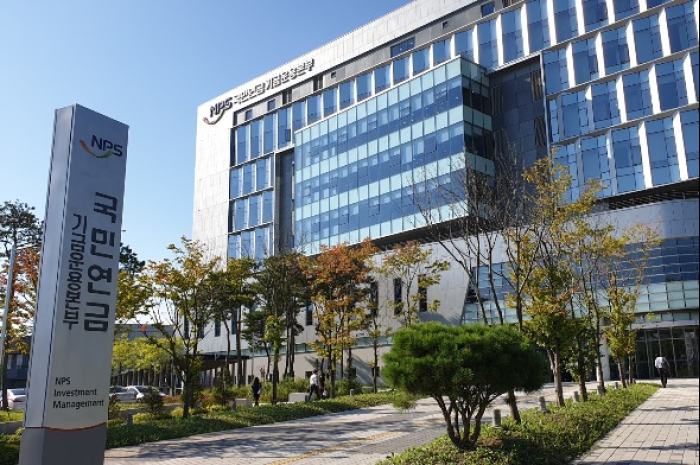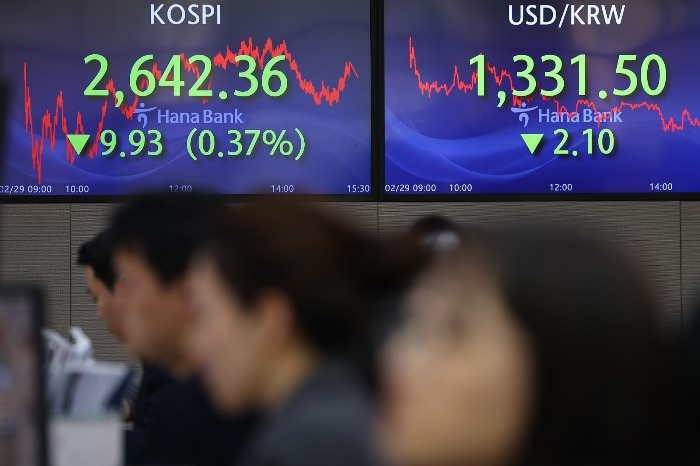Korean stock market
NPS to invest up to $8.2 bn in undervalued Korean stocks
Korea’s No. 1 institutional investor will develop a special index for undervalued local stocks to drive the state's 'value-up' push
By Mar 01, 2024 (Gmt+09:00)
3
Min read
Most Read
LG Chem to sell water filter business to Glenwood PE for $692 million


KT&G eyes overseas M&A after rejecting activist fund's offer


Mirae Asset to be named Korea Post’s core real estate fund operator


StockX in merger talks with Naver’s online reseller Kream


Meritz backs half of ex-manager’s $210 mn hedge fund



South Korea’s National Pension Service (NPS), the world’s third-largest pension fund, is expected to invest up to 11 trillion won ($8.2 billion) in undervalued local stocks to join the government’s push to buoy the country’s anemic stock market.
According to sources in the investment banking industry on Thursday, the country’s sole stock market operator the Korea Exchange (KRX) is in talks with NPS to develop a new index tracking undervalued local stocks following government guidance to bolster their corporate value.
Once the new index, tentatively called the Korea Value-up Index, is developed, the country’s biggest institutional investor is expected to use it as one of the benchmark indices for equity investments by its external asset managers.
NPS uses benchmark indices as yardsticks for the performance of its outsourced domestic equity investments.
The pension fund either makes direct investments into local equities or delegates external asset managers to invest assets worth 75.4 trillion won in eight-tiered groups of equities.
NPS’s assets under management reached 1,036 trillion won as of December 2023.
The latest move comes after the Korean government announced earlier this week basic guidelines for the so-called corporate value-up program designed to boost listed firms’ value underperforming their global peers despite their solid earnings.
11 TRILLION WON TO FIRE UP THE VALUE-UP PROGRAM
However, disappointed by the guidelines, investors dumped those undervalued stocks with a price-to-book ratio (PBR) of less than 1, which they had gobbled up since earlier this year on expectations of the program.

In an apparent move to back the government’s push to fire up the local stock market, NPS is expected to use the Korea Value-up Index as a benchmark index that is expected to replace the existing index covering value stocks.
Of total assets managed by external asset managers, 5%, or 3.7 trillion won, is currently invested in value stocks.
If NPS also chooses to invest 10% of its assets, which are currently allocated to stocks covered by another benchmark index, the so-called Responsible Investment Index, it would be able to invest up to 11 trillion won in total in undervalued Korean stocks under the new index.
This is not the first time NPS and KRX have co-developed a benchmark index. In 2021, they jointly developed the NPS-KR 250 Index, which serves as a benchmark for the pension fund’s direct equity investments with constituent stocks listed on the Kospi and the Kosdaq.
The Korean government earlier this year vowed to come up with measures to resuscitate the local stock market, which has been underperforming its global peers.
Korea’s benchmark stock index Kospi rose a mere 1% year to date, while Japan’s benchmark Nikkei 225 index jumped nearly 18% over the same period. US’s S&P 500 and Nasdaq closed at record highs on Thursday.
As part of the Korean government’s efforts to reinvigorate the local stock market, it has focused on low PBR stocks, which are considered undervalued, and the so-called corporate value-up program is at the center.
The program benchmarks the Japanese government’s decade-old capital market revival program introduced under the former Abe Shinzo administration in the early 2010s.
Japan is also known to receive help from its national pension service, the Government Pension Investment Fund (GPIF), to boost the country’s undervalued stocks.
GPIF invested 24.7% of its total assets into Japanese stocks as of the end of last year, more than doubled from 2010 when its asset allocation into local stocks stood at 11.5%.
Write to Byeong-Hwa Ryu and Jun-Ho Cha at hwahwa@hankyung.com
Sookyung Seo edited this article.
More to Read
-
 Pension fundsNPS logs record return rate in 2023 on stocks’ bull run
Pension fundsNPS logs record return rate in 2023 on stocks’ bull runFeb 28, 2024 (Gmt+09:00)
2 Min read -
 Korean stock marketKorea announces measures to upvalue local shares
Korean stock marketKorea announces measures to upvalue local sharesFeb 26, 2024 (Gmt+09:00)
2 Min read -
 The KED ViewDefy convention with long-run plans to upvalue Korean stocks
The KED ViewDefy convention with long-run plans to upvalue Korean stocksFeb 23, 2024 (Gmt+09:00)
4 Min read -
 NPS to raise exposure to Kosdaq-listed blue chips
NPS to raise exposure to Kosdaq-listed blue chipsJul 18, 2021 (Gmt+09:00)
2 Min read
Comment 0
LOG IN


